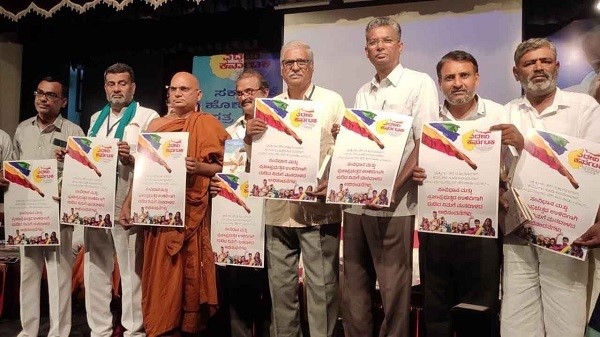Part-1- The genesis behind this concept
There is popular saying, “In victory, all become fathers and mothers, defeat remains an orphan”. This reflects a harsh reality. So much is being said about the hearty outcome of this campaign, Eddelu Karnataka. Eddelu Karnataka means simply, Wake-Up Karnataka and the name too was chosen in a participative way! Yet, inevitably, there have been a few articles that undermine the efforts of citizens coming together –yes, civil society and its role—belittling the significance of defeating the BJP in this crucial assembly election. This, in a sense, undermines the very essence of a hard earned victory. Although not entirely surprising, this situation also provokes contemplation. We have been, many of us together, engaged in a relentless race and even as the journey has been through challenging paths, I am responding to the insistence of many who have urged that the experiences and learnings are shared.
In four parts, I attempt this detailed documentation.
The following aspects need to be underlined to start with.
First, these points are crucial.
To the best of my / our knowledge, there has been no singular assertion that it is Eddelu Karnataka alone being the cause, or primary factor behind this positive outcome. The combined actions and interventions of diverse social forces has not ever, and cannot be claimed to be to the exclusive credit of Eddelu Karnataka. As critically, none of individually or collectively from within the social movements of Karnataka, is naïve enough to believe that the Bharaitiya Janata Party (BJP) has lost ground, that Hindutva has retreated, and, finally, Karnataka is shielded from the perils of communalism let alone fascism. Neither, no one within Eddelu Karnataka harbours the illusion that the Congress party is a viable political solution or an alternative for our nation.
Secondly, it is crucial to note that the Wake Up Karnataka Executive Council Review meeting has not yet taken place. Therefore, the views expressed in this writing are solely my personal opinions.
Thirdly, it is crucial to clarify that the intention behind this writing is not to just applaud the accomplishments of Eddelu Karnataka. Instead, its purpose is to share some valuable lessons derived from this distinct and rather special journey. In these dark, despairing and isolating times, within which elections are snared and engulfed by the influence of money, caste divisions, and communal politics, a question arises: Why should social organisations engage in such meaningful endeavours? The experience of Karnataka has revealed that the answer to this question lies not in a definitive solution but rather in a compass that guides our actions. Hence, it is imperative for dedicated social workers, committed to the preservation of our nation, to carefully study and reflect upon this matter. With the intention of offering possible assistance to developing this understanding, I am sharing my experiences in writing, here.
Brief Background: Karnataka has witnessed a significant rise in communalism, prompting a strong legacy of resistance against it within the state. The Karnataka Anti-Communal Forum (Karnataka Kaumvada Souharada Vedike) emerged as the most organised and enduring initiative in countering communal forces. In addition to the aforementioned efforts, several other initiatives have emerged, such as the Samana Manaskara Vedike, Samvidhana Ulivigagi Karnataka (Karnataka for Saving the Constitution, Deshakkagi Navu (We for the Country), Sahamata, Manava Bandhutva Vedike (Human Brotherhood Forum), Bhahutva (Pluralism), Janapara Sanghatanegala Okkota (Union of People’s Organizations), Sahabalve (Peaceful Co-existence) and more.
Equally, numerous left-wing, democratic, Dalit, and minority organizations have been actively resisting the oppressive influence of fascist power through their own unique approaches. In recent times, a significant number of social organizations, including farmers’ associations, women’s organizations, labour unions, and more, have taken a firm stance against these forces. As a result, the Bharatiya Janata Party (BJP) BJP and Sangh Parivar are being challenged and resisted by various social organisations in Karnataka, each employing their own distinctive methods.
Social organisations have been actively engaged in intervening in every election, and the scale and momentum of their involvement has been increasing. Now, this time, we are able to see a significant leap in their efforts. Among the collective endeavors to counter these forces, four initiatives have emerged as particularly noteworthy in recent times.
- In May 2022, progressive forces congregated at the Udupi Peaceful Coexistence Conference and collectively arrived at the conclusion that “We must persistently strive to liberate Karnataka from the politics of hatred.”
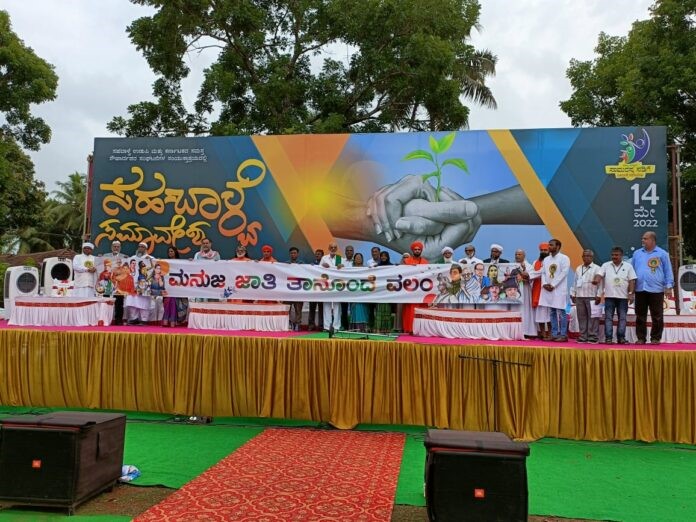
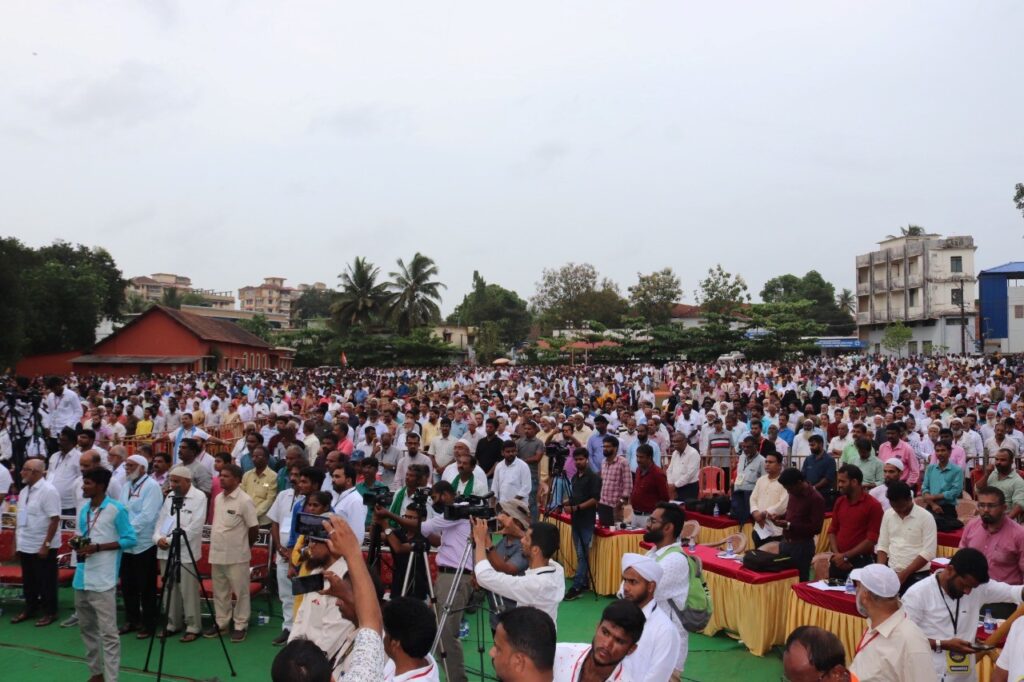
- On December 6, 2022, different factions of the Dalit Sangharsh Samiti (DSS) forces joined to organise a substantial resistance conference, unequivocally proclaiming that “our primary objective is to triumph over the fascist forces.”
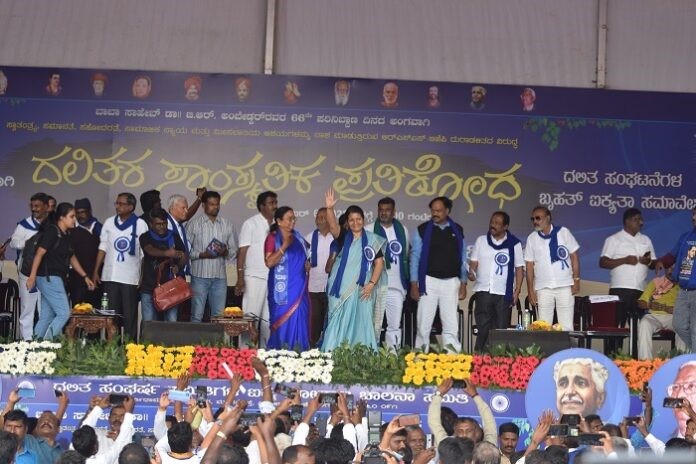
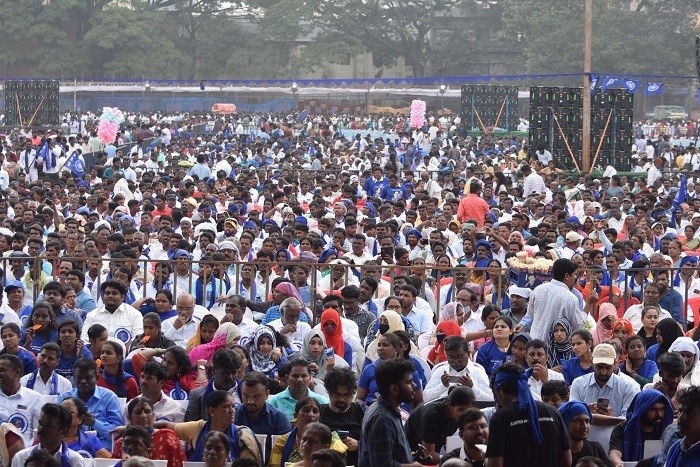
- On February 16, 2023 in Bengaluru, various farmers organisations, farm labor organizations, Dalit Organisations, and workers organizations, under the banner of Samyukta Horata) united struggle convened a public gathering for people’s demands, and collectively resolved to “impart a fitting lesson to the anti-people BJP in the forthcoming elections.”
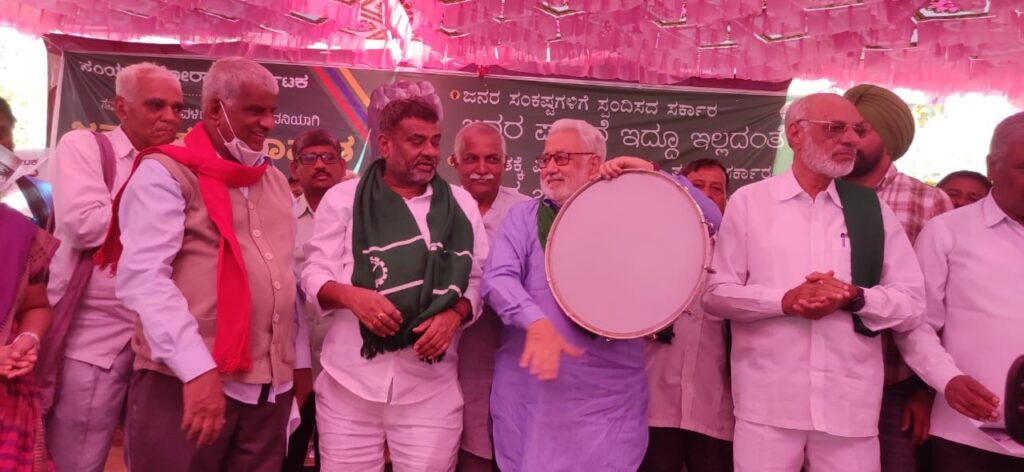

- Numerous dedicated organisations actively took part in the central workshop held at Jai Bheem Bhawan, Bangalore on March 5, which collectively urged for the identification of 150 committed organisers from 20 districts. They arrived at a decisive resolution under the banner of “Eddelu Karnataka” to “identify critical constituencies and immerse themselves at the grassroots level, diligently working with a well-defined plan.”


‘Wake up’ Plan: The conclusion derived from the aforementioned workshop is that the overarching slogan of “defeating communal forces” holds limited efficacy. Instead, it is imperative to engage in efforts that directly influence the voting process.
To achieve this goal:
Our focus should be directed towards assembly constituencies where there is intense competition with the BJP. Specifically, we should target constituencies where the BJP and other parties are engaged in a close contest, where the margin of victory is narrow. By strategically selecting and actively engaging in these constituencies, a mere shift of 5-10,000 votes can significantly impact the results. It is crucial to leverage our social networks and abilities to influence the outcome by targeting and influencing these specific votes. To facilitate this, dedicated teams of volunteers should be formed, and a well-planned approach should be implemented in these areas.
In the chosen constituencies, our efforts should be focused on enhancing voter turnout by fostering grassroots awareness, minimising vote division, and persuading diverse segments of the population about the significance of defeating the BJP.
A scientifically conducted survey should be undertaken to gauge public sentiment, enabling the creation of a narrative that addresses the deeply felt concerns of the people. Extensive efforts should be made on social media platforms, along with the publication of diverse literature, to effectively disseminate this narrative.
Crucially, it is paramount that all these endeavors are conducted without accepting any financial support from any of the political parties or candidates. By ensuring an independent and ethical civil campaign, we can maintain the moral strength required to criticize all parties and communicate with the public in a selfless manner.
(To be Continued: Part-2: How ‘Eddelu Karnataka’ Worked)
Related
Vote Share Percentage, Politics, Propaganda or Mathematics: Karnataka 2023
What Karnataka thinks today, will India think tomorrow?
Social media campaigns seeking accountability gain traction ahead of Karnataka assembly elections
